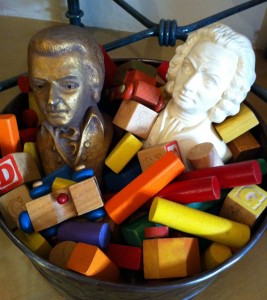Playing With Wolfgang
 No one was more surprised than I when I conceived of the Menuetto to my Mozart Sonata as a heated discussion between a married couple. When I talked about it, my musical friends gave me funny smiles and quickly began to discuss the weather. I second guessed myself while driving to school and decided that it had been something in the water. But, when I returned to the keyboard, there it was again—an argument plain and simple.
No one was more surprised than I when I conceived of the Menuetto to my Mozart Sonata as a heated discussion between a married couple. When I talked about it, my musical friends gave me funny smiles and quickly began to discuss the weather. I second guessed myself while driving to school and decided that it had been something in the water. But, when I returned to the keyboard, there it was again—an argument plain and simple.
I was preparing the Sonata in A K. 331 for a performance and the supposedly simplest movement was giving me the most interpretive headaches. The Menuetto was simply not cutting it. I couldn’t get a handle on it. It seemed all broken into bits and I couldn’t connect the bits or make it work as more fragmented thoughts. And what was up with the Beethoven like dynamics?
I listened to as many performances of the piece as I could get my hands on and then expanded to Mozart symphonies and of course opera. No immediate insights. Then, one night I woke up at something like 3:30 a.m. and was suddenly hearing the Menuetto as opera. Specifically as the aforementioned argument.
When I got to the piano later that morning (unfortunately children and a husband would have strenuously objected to my need to play it at 3:30 a.m. ah, irony…), the Menuetto held together and made absolute sense to me. I recorded it and listened. It still made sense. It was demanding, placating, submissive, wily, whiney, nagging, insistent, and more. The trio was harmonious and loving and the opposite of all the above. And, of course, all this fits like a glove with the themes in Mozart’s operas.
The surprise of that discovery has remained with me. Perhaps I had to be 40 and married with children to receive it or perhaps it was the water. In any case, I was and am grateful for the insight.
Introducing (ta-da) Playing With Wolfgang
Have you had a surprising insight that changed you and your playing? Do you have links to performances or information that you would like to share? Do you have a great story to tell? Well today, I’m introducing a new Piano Addict Feature: Playing With Wolfgang. The plan is to feature a different composer approximately every month.
I was inspired by a blog called Tuesdays With Dorie in which everyone makes the same recipe and then shares pictures and recounts their experiences of the process. I thought- why can’t we do that with piano music? So, I am inviting (OK begging) you to share your, recordings, links to articles and resources, images, personal stories, and questions in the comment section of each post. And, since we are all busy with our various careers and professional commitments, I decided to broaden the scope and include all piano works by a single composer and invite you all to share more than just playing experiences.
So, please feel free to share links, teaching learning & playing experiences, images, sound & video files, and anything else you feel is in the scope of each month’s topic. In order to share images or videos you will need to include a link to a service such as YouTube, SoundCloud, or Flicker in your comment. Of course, you may also comment on the Piano Addict Facebook Page, but not everyone will get the benefit of your contribution that way. Please keep your comments on topic, which this month is all things Mozart.
Are you in??? Press the comment button and start sharing! (you know you want to)



Here is some klezmer Mozart! http://t.co/OJJzICJ
depressing and awesome at the same time:) Not sure he thought he could influence brotherhood and change the world like Beethoven tried to do though.
Yes, certainly. Mozart was all about relationships! In his Freemasonry stage it was even more so. All those running thirds and sixths–relationship. Brotherhood. Agreement. And there’s plenty of stress to be heard in all that dialog too. Mozart themes often sound like characters, each with his/her personality and agenda. We might think of orchestral or instrumental Mozart as “absolute” music and opera as programmatic, but–no, his instrumental works are as programmatic as we think they are.
The most depressing thing about Mozart, for me, is the fact that when he was my age, he had been dead for years. . .
Don’t forget to check out the links in the Twitter widget in the right column of this page. Here’s one that caught my eye. Just tag your tweets #mozart to join the conversation. http://jessicamusic.blogspot.com/2011/06/roll-over-amadeus.html
Great point! Thanks. It’s wonderful that we have so many ways to get close to the music we play.
Ah…the deceivingly simple yet complicated music Mozart bestowed upon the piano world. I have often struggled with interpretation of his later works, as it leans so far into Beethovenesque romanticism that it is hard to maintain the typical Mozart sound which permeates his music.
As pianists, however, we do have the upper hand in understanding, even intimately understanding his innermost thoughts and feelings. He was gifted in writing in all music media of his time, but I feel that he thought, breathed, felt and dreamed with keyboard music. After all, it was his first instrument, and my experience is that one always comes back to the first instrument and that deep connection always stays.
So, if you really want to know how his piano music was meant to sound, studying his life and events that shaped him is most important. It could be surprising to see how his piano music is closely connected to his life experiences.